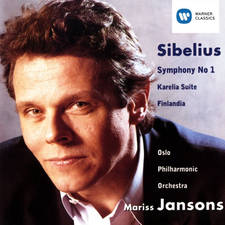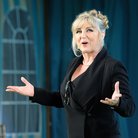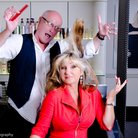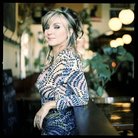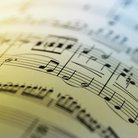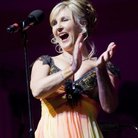Lesley Garrett: Absolutely Fabulous
Lesley Garrett in the flesh is much prettier than her glamorous press shots suggest, with honey blonde hair swept artlessly back from a heart-shaped face and huge hazel eyes.
“I’m sorry if I’m not firing on all cylinders,” she apologises as she plonks herself down beside me on the sofa, “but I only had three hours’ sleep last night.” It doesn’t seem to have affected her brainpower – her conversation is peppered with words like “disenfranchise”, “amalgamation” and “salutary”. And she looks a million dollars, even on this rainy morning in west London.
She’s just back from a twice-weekly singing lesson with her professor of 20 years, Joy Mammen. Surely after six years at the Royal Academy and the National Opera Studio, and 20 years on the stage, Lesley doesn’t still need lessons?
“I keep training because I want to keep improving and stretching what I can do. The projects I do are so varied and my technique has to be able to cope with all of them. Last Saturday, for example, I was at Old Trafford singing for the Super League Rugby cup final – I sang Jerusalem in front of 64,000 people. The night before I was in Edinburgh doing The Merry Widow, not a microphone in sight, to maybe 1800 people. I love that variety!”
Her welcoming approach to an art form many people find daunting makes her popular.
“I know people out there absolutely love opera, but they’re not confident about it, and they still feel it’s a rather strange, Continental art form. As soon as you get their attention with something like West Side Story, they realise it isn’t what they thought. It isn’t all inappropriately shaped people screaming at the tops of their voices in a language people couldn’t understand, even if they could hear the words.”
Lesley herself is enviably slim. She puts it down to good genes (“I’m like my mum – big bust and a boy’s bum!”) and the fact that she’s constantly rushing to fit everything in – concerts, recordings, and time with her husband and children. “And singing is a very energetic occupation,” she says. “I don’t know how you can sing if you’re not fit.”
Léhar’s The Merry Widow is the first opera (or operetta) Lesley Garrett has done for nearly five years. Why the long gap since her last appearance as Rosina at ENO?
“I’ve been busy with television, concerts and recordings, but I longed to get back into an ensemble piece. There’s nothing quite like making music with other people, and bringing drama to life.”
When Anthony Freud, then general director of Welsh National Opera, asked her to take the leading role of Hanna, the Widow, she jumped at the chance.
“He saw my career was veering away from opera, and I think he wanted me on his stage.”
It brings the story full circle: WNO was the first British company to give the young Lesley Garrett work, over 20 years ago. She found the week leading up to the first night utterly exhausting.
“It reminded me of what an extreme sport opera is. It’s like those people who jump out of aeroplanes with a surfboard,” she says. “People underestimate operetta at their peril. The music is really demanding: Léhar’s orchestras are enormous, then you have spoken dialogue over the orchestra, and dancing. Nonetheless, I’m thrilled to be doing it.”
The Widow is a perfect choice for Lesley’s stage return: even her harshest critics agree that her bright soprano is still clear and flexible and her stylish and effervescent presence lights up the production. Even the sometimes stuffy Guardian was impressed. “As glamorous as expected in the first of several Agostino Cavalca gowns, Garrett’s playful joie de vivre as the wealthy widow in search of a new husband enlivens a largely masculine show,” its critic noted.
The Merry Widow now tops the list of Lesley’s favourite operas. “It’s a very funny show, with beautiful music. Every tune is a winner, and the dancing I just adore!” she says.
Fans of the TV competition Strictly Come Dancing will know just how much Lesley adores it. She and professional dancer Anton Du Beke made it to the semi-finals in the first series and she now dances regularly with her GP husband Peter.
“He says dancing with him must be like driving a Morris Minor when you’re used to a Ferrari,” says Lesley fondly. “But I really admire his tenacity.”
It’s become something of a mission for the lyric soprano from Doncaster to spread the word about opera, through her appearances on TV and gala concerts. “But people should be able to see the entire opera live,” she insists. “Excerpts are one thing, but the mind-blowing experience of a fully fledged opera, with full orchestra, is second to no experience on earth.”
Without denigrating them, she points out that some of today’s singers can’t lead their audiences to the real opera experience. “Ten years ago, when I started to do concerts and TV, people like Kiri Te Kanawa and the Three Tenors were doing galas and aria recordings, but they had big opera careers. Now people like Katherine Jenkins or Aled Jones sing opera excerpts and they’re fine performers but they are not opera singers. The public is not going to be able to see them in an opera. So who is making the link between opera and entertainment?”
The answer is, of course, Lesley Garrett, although she often gets a hard ride from the critics for doing it. “In my heart of hearts I know I’m reaching people who otherwise wouldn’t be reached. Nasty reviews are not going to contribute to the spread of classical music, but somebody with a friendly face and a welcoming demeanour will.” In 2002 Lesley was rewarded for her positive attitude when she received a CBE for services to music.
She’s a fantastic advert for being over 50. But how did she feel about reaching her half-century? “Fabulous! There are very few of my contemporaries, light lyric sopranos like me, who are still working. I just thank the Lord every day that I’ve had so many opportunities.”
But she’s being far too modest. Lesley has created these opportunities herself, with drive and ambition, hard work and adaptability. “The only plan I’ve ever had was to work as close to home as possible so I didn’t need to leave the kids for long periods of time. And then along came television, radio and gala concerts and recordings. And I know there’s going to be more. What being 50 has given me is a wonderful sense that I really don’t need to worry any more. That I’m here, I’ve arrived and I’m staying!”
